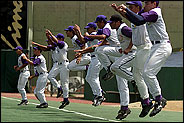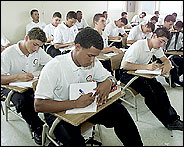|
 |
|
Esta página no está disponible en español. THE NEW YORK TIMES Baseball And Books: Puerto Rican Academy Grooms Players By RAFAEL HERMOSO April 13, 2003
PHOTO: Ricardo Figueroa GURABO, P.R., April 11 - They stream from the parking lots at Universidad del Turabo each weekday at 7:30 a.m. looking like major leaguers ready for a road trip. Dressed in sparkling white jerseys with purple shorts, sleeves and caps and garment bags draped over their shoulders, more than 100 boys ages 15 to 17 file into a cramped cafeteria for their 8 o'clock meeting. They are all completing their first academic year in the Puerto Rico Baseball Academy and High School, perhaps the first school anywhere to offer a concentration in the sport. Oscar Marrero, a 16-year-old catcher, wakes up at 4:10 each morning for his hour-and-a-half-to-two-hour commute. "I'm here for my future," said Marrero, whose parents removed him from public school to put him in the program here. "Here, it's unique. I have sports and education, and I like baseball. I know I'll gain something." The school is the brainchild of Edwin Correa, the Texas Rangers pitcher who blew out his arm in the late 1980's and later left a coaching career to return to his homeland. Here, in a one-story building 30 minutes south of San Juan, Correa is trying to salvage Puerto Rican baseball, which has sent fewer players to the major leagues in recent years. This season, 38 major league players on opening-day rosters came from Puerto Rico, compared with 79 from the Dominican Republic. The amateur draft's numbers are even more remarkable. Fifty-five Puerto Ricans were taken in 1989, the first year they were subject to the draft; 37 were drafted the next year and 23 last June.
PHOTO: Ricardo Figueroa With a tropical climate, strong financial backing as a United States territory and a higher standard of living than the Dominican Republic, Puerto Rico should be a baseball nirvana. So why has it fallen so far behind its neighbor? Dominicans are exempt from the draft and can sign with major league organizations as early as age 16, while Puerto Ricans, as United States citizens, must wait until their high school class graduates or they turn 18 to enter the draft. And while they compete with Americans for draft positions and bonuses, Puerto Ricans have no high school leagues and are limited to amateur teams that play on the weekends. Even the relatively high quality of life can be a disadvantage, said Javier Vazquez, the Montreal Expos pitcher who will face the Mets on Monday on in San Juan. "I think the kids in Puerto Rico have a lot of comforts," said Vazquez, one of the handful of Puerto Rican stars to come out of the draft. "They have computers, PlayStations, all types of things like that. A kid has a life outside of sports." Tony Bernazard, a former major leaguer from Caguas and special assistant to Donald Fehr, executive director of the players association, has long lamented his island's baseball drought. Puerto Ricans were not included in the draft until 1989, and Bernazard feels that perhaps the reason for the switch was to reduce bonuses awarded to them. He pointed out that Puerto Ricans were included in the draft shortly after Ivan Rodriguez, Carlos Baerga, Juan Gonzalez and Carlos Delgado received large bonuses. "Unfortunately, some people think players outside the U.S. shouldn't get the same bonuses as players in the U.S.," Bernazard said in a telephone interview. "I don't want to think that, but you wonder." Correa is trying to fill the void in development. He was a pitching coach for the Los Angeles Dodgers when his son Joshua was found to have a brain tumor, forcing Correa to return home. The tumor was benign, and Joshua, now 10, is a power-hitting third baseman and pitcher, and a future candidate for the academy. Correa, 36, began spreading his idea of a baseball high school four years ago. Told to get it running before Major League Baseball or the players association would invest, Correa spent $200,000 on the start-up. Three newspapers advertisements drew 500 for tryouts last spring. The best then faced an academic exam and an interview. Last August, the class of 2004 began with 107 boys. Another 50 will enroll this summer. If every applicant were accepted, Correa said, he would have 1,600 students. Sandy Alderson, baseball's executive vice president for operations, visited the academy in January and made a financial commitment, which Correa said would be $200,000. "There's probably always a little skepticism when it comes to this type of program, whether it's Puerto Rico or anywhere else," Alderson said by telephone. "Besides the logistics, what are the motivations of the individual involved? Are they as honest and altruistic as they say? I think in Edwin's case, it's been borne out." Correa spent years researching the project. He wanted to eliminate distractions, so he designed a long school day, forcing the students to arrive home too exhausted for video games. He spoke with prep schools in the United States to gauge their costs. He revisited Las Palmas, the Dodgers' Dominican complex where he coached, and expanded on that model. Correa recognized that children in the Dominican Republic "have that hunger to play, that desire to leave their country or to have a better future." "One thing we want to instill in our players is desire,'' Correa said. "To want to wake up at 4:30 in the morning and be at school, that takes discipline." The academy's $5,500 tuition sounds steep, but players have help. Vazquez, Delgado, Gonzalez and other Puerto Rican major leaguers have lectured and donated scholarships. Sixty-six students receive some form of financial aid, the administrator Lucy Batista said. The university in Gurabo donated one building and classrooms, asking Correa to pay only the utility bills. The nearby town of Caguas donated its stadium. The academy aims to develop boys for the draft or college scholarships. An accelerated academic program allows them to complete their sophomore, junior and senior years in 24 months and earn their diplomas at 17, so they may be drafted a year early. Students practice baseball for three hours in the morning and take classes for four hours after lunch. Ibrahim Lopez, a 17-year-old center fielder on a full scholarship, never took studying seriously before. His focus is still on getting to the big leagues, but "now we know how to get a career if we don't get there." Always thinking big, Correa wants to build a $28.6 million facility for the academy, including dorms, a stadium, a library and a pool for 1,000 students on land that the town of Gurabo offered to lease for $1 a year. That expansion would include a softball program for girls and baseball-related studies like umpiring, training, scouting and journalism. He envisions islandwide junior high schools funneling students to the academy. Alderson wants to see a graduating class before investing in real estate. Correa believes at least 30 players may be drafted next summer. In five years, Correa hopes to have his first graduate in the major leagues. His school could serve as a model if baseball institutes a world draft. Correa said he is a distant cousin of Roberto Clemente, whom he called "the greatest thing Puerto Rico has ever produced." He feels the same obligation to help others that Clemente did. For Correa, who earns $4,000 a month as the school's president, the real rewards are priceless. "What do I gain? Satisfaction," Correa said. "It brings me peace to know I'm returning to baseball what it gave me. It gives me great satisfaction hearing a parent say, 'Thank you for giving my son discipline.' I get the same thrill as I did starting at Yankee Stadium and throwing a shutout."
|

 ----------
---------- ----------
----------